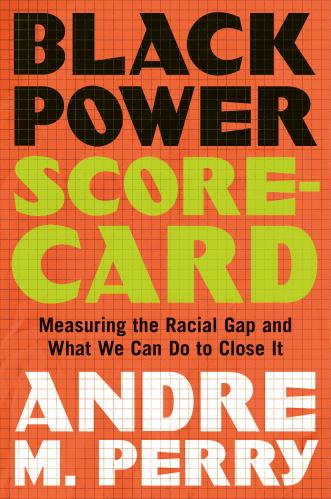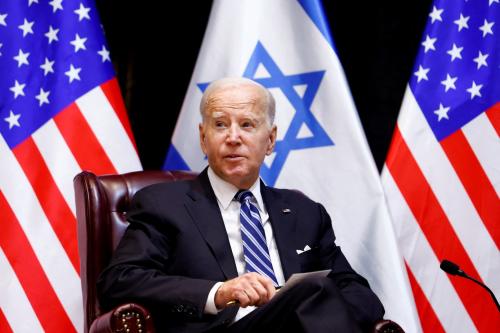While they did not produce a clear winner, Israel’s elections represented a step away from the annexation of parts of the West Bank or the erosion of the power of Israel’s Supreme Court, argues Natan Sachs. This piece originally appeared in The Atlantic.
Israel’s second election of 2019 managed to produce both high drama and anticlimax. The top-line result: There is no clear winner. Neither the right-wing bloc led by Prime Minister Benjamin Netanyahu, nor the center-left bloc led by former military Chief of Staff Benny Gantz, commanded a majority of the 120 seats in the 22nd Knesset. But there was still a loser of sorts: Netanyahu.
The one thing that was clear, following the election, was that the results signal a dramatic shift in policy. Israel had stepped all the way to the brink on two fundamental issues, and it has now taken a half step back. These results scuttle Netanyahu’s plans to officially apply Israeli law to parts of the West Bank, annexing the Jordan Valley, and to curtail the Israeli Supreme Court’s powers in order to secure himself immunity from prosecution on corruption charges. Both issues would have had serious ramifications, the former for the possibility of resolving the Israeli-Palestinian conflict in the future, and the latter for the health of Israeli democracy. Tuesday’s results will not produce peace nor resolve Israel’s internal challenges, but they stave off those prospects, at least for the moment.
The odd thing is, had the first general elections of 2019, in April, ended with these same results, Netanyahu would have been declared the clear winner, the Supreme Court would have appeared in danger, and annexation would be on the table. In fact, the April results were, on the surface, very similar to these returns, and Netanyahu was universally proclaimed the victor, as I wrote the day after those elections.
Then, something odd happened: Avigdor Lieberman, who had been Netanyahu’s right-hand man in the 1990s and later served under him as foreign minister and then defense minister, refused to join the right-wing coalition with his small party unless a bill was passed aimed at military conscription of ultra-Orthodox men. This was an act of political theater — the bill would not have changed very much — but to everyone’s surprise, Lieberman held out until Netanyahu’s mandate to form a government expired. Legally, the president of Israel would then have had to task another member of Knesset with forming a government, essentially barring Netanyahu from the role. To prevent this, Netanyahu pushed the Knesset to dissolve itself and call for a second national election in less than six months.
With 98 percent of the votes counted in these September results (final results may differ marginally from these, but not in their overall significance), the opposition Blue and White, headed by Gantz, leads at 33 seats, with Netanyahu’s Likud party trailing slightly, at 31 seats. Third is the Joint List, an amalgam of four parties representing mostly Arab citizens of Israel, with 13. The leading ultra-Orthodox parties, Shas and United Torah Judaism, came in at nine and eight, respectively. Lieberman’s Yisrael Beitenu has eight. The right-wing Yamina gained seven. Labor — the old party of David Ben-Gurion and later Yitzhak Rabin — received a paltry six. And the Democratic Union, composed of the left-wing Meretz, former prime minister Ehud Barak, and former Labor parliamentarian Stav Shaffir, rounds out the Knesset with five. To the credit of Israeli voters, Otzma Yehudit, an extreme right-wing party and successor to Meir Kahana’s racist Kach, failed to pass the minimum threshold of 3.25 percent of the vote.

For an inconclusive mess, the election results actually appear quite neatly arranged. The anti-Netanyahu and the pro-Netanyahu camps are near even, with 57 to the center-left and 55 to the right-religious bloc. And Lieberman is at the pivot, precisely where he hoped to be.

The math seems clear then: No one has the majority necessary to form a governing coalition. Netanyahu will have the backing of the full 55 (or so) seats of the right wing, but unless he can entice Lieberman to re-join him or someone from the opposition to defect — a possibility, for the right price, but one which Lieberman and others discount — he will fall short of the magic number of 61.
Should Gantz receive a mandate from Israel’s president to try to form a coalition, he would not be able to form one with the Joint List (they have ruled each other out for now). Nor would he be able to bring both Lieberman and the Democratic Union into the same government. Nor would the ultra-Orthodox parties — which sometimes join the center-left — likely join without major concessions from Lieberman and Gantz’s own partner, the secularist Yair Lapid. Never say never, but at present his path appears blocked.
Unless someone breaks rank or Lieberman changes his mind — always a possibility — there is no coalition that does not include both major parties, Likud and Blue and White. But such a national-unity government would not be a first. The classic precedent for it was set in the 1980s, and that earlier coalition offers some useful lessons for the present.
In the elections to the 11th Knesset in 1984, the Alignment (based around Labor) received 44 seats to the Likud’s 41. Neither bloc had a majority. The country was deadlocked, with no coalition in sight. The president at the time, Chaim Herzog, intervened, twisting arms and cajoling both parties to form a joint government. The two parties even agreed to a rotation in the prime minister’s post: Shimon Peres of Labor was prime minister for the first two years, and Yitzhak Shamir of the Likud led the country for another two (and then beyond). The government could agree on nothing in terms of negotiations with Israel’s Arab neighbors, producing a “national paralysis government” in foreign affairs, but it was one of Israel’s most successful governments in terms of domestic policy. Inflation, which hit an astounding 445 percent in 1984, was brought down to 16.4 percent by 1988. Israel also withdrew from most of Lebanon’s territory, downscaling a bloody intervention.
Rotation and national unity would seem to be the solution now as well. Blue and White and Likud actually agree on more than did Labor and Likud in 1984 (Blue and White includes several recent members of the Likud), but they disagree on one important issue: Benjamin Netanyahu. Blue and White was formed with the express purpose of beating Bibi. To serve under him now would be a betrayal of their voters.
Of course, politicians have betrayed voters before, and it is certainly possible that, under the right terms, Blue and White would do so. However, one further issue stands in the way: Netanyahu is likely to face indictment in three different criminal cases, including a charge of bribery. Israel’s attorney general has announced his intention, pending a final hearing, to indict the prime minister. The hearing is scheduled to take place in a couple of weeks, and the final decision is expected in late November or early December, just when coalition formation must wrap up. Blue and White made a special point of promising not to serve under a prime minister on trial. And if indicted, Netanyahu could not serve as a minister under a Prime Minister Gantz, because a minister (though not a prime minister) cannot legally serve while on trial for a crime.
One way out of the mess, it would seem, would be for the Likud to jettison Netanyahu in favor of another leader. That leader could then agree on rotation with Gantz (albeit an agreement either side may renege on in two years’ time, of course) and form a more-or-less stable government. The Likud, however, tends to be very loyal to its leaders. It has had a grand total of four since the state’s founding, in 1948. For the party elite to select a new leader, it would need sound political cover to excuse the coup to its base.
If the president tasks Netanyahu with forming a government, and he fails, that may be the cover the Likud needs. Then, Netanyahu would be nearly barred from forming a government, and the Likud would face a third election in one year, a Gantz premiership, or rotation between Gantz and another Likud leader.
If you’re not confused by now, you haven’t been paying attention. There doesn’t seem to be an easy answer to this mess. To quote a certain Sicilian, “We are at an impasse.” The best bet, however, would be a national-unity government that included Gantz, probably Lieberman, and someone from the Likud — Netanyahu or someone else. On the eve of the election, I wrote — answering the question of who would win — “Beats me.” I’m still stumped.
Yet despite all the uncertainty, the bottom line remains more important than partisan politics. The election is ultimately about policy, about the prospect of peace some day, and about the health of Israeli democracy itself.
Most Israeli policy would not change with a different prime minister. The basic attitudes of Lieberman, Likud, and Blue and White on Iran, on Hezbollah, on Hamas, on world relations, and even on the prospects of achieving peace with the Palestinians, are all more or less in consensus. A Gantz government would at least hope for a different outcome with the Palestinians and would take a slightly different approach to managing the protracted interim—a small but meaningful difference. But in terms of actionable policy, continuity would be the rule.
The need for change in Israel is, nonetheless, acute. Netanyahu was, for most of his long term, a relatively cautious — if hawkish and bellicose — leader. He talked tough, but he rarely went to war. This was part of the secret of his success. He was always focused on his political survival, but for the most part he was also a responsible leader on matters of national security.
That caution and modicum of responsibility seem to have dissipated in recent years. With his political longevity — he’s now Israel’s longest-serving prime minister — and repeated victories at the polls, he apparently started to buy the empty flattery thrown at him and to believe that he was irreplaceable. He may genuinely think that for Israel’s sake — and not just for his own legal salvation — he must stay in power, but he has lost his sense of responsibility in the process.
In the days leading up to the elections, Amos Harel and Chaim Levinson of Haaretz reported that Netanyahu was actually prepared to launch a major escalation in the Gaza Strip, necessitating the postponement of the election, all without properly consulting the security chiefs. Only after their adamant objections and the intervention of the attorney general, who demanded a proper process for such a decision, was the plan set aside. The cautious Netanyahu of old, who held national security above any other considerations, is simply gone.
Then, Netanyahu announced his intention to annex the Jordan Valley. Reports suggest he intended to announce the actual annexation then and there, during the campaign, with no preparation or debate among the security or planning staffs. Annexation would be a reckless policy in the best of times, but demonstrated an astounding lack of responsibility in those circumstances. It was again the security chiefs who pushed back, causing him to hesitate.
Then, on election day, Netanyahu disregarded the clear letter of the law and the instructions of the head of the electoral committee, a Supreme Court justice; he continued to broadcast his campaign on the internet, even when campaigning must legally be paused. He even tweeted about continuing to broadcast, in a brazen display of disregard for the law.
Netanyahu, with all his many faults, is a very talented man. His long tenure is mixed. His detractors, myself included, often overlook many of his achievements, as his admirers frequently turn a blind eye to his many faults and misdeeds. But whatever one’s view of Netanyahu, his increasing recklessness needed to be checked.
These most recent elections, after all, were about him personally. Another Likud leader could have formed a government back in April, had Netanyahu simply stepped aside. Israeli politics have become a one-man-show and, regardless of the identity of the man or woman in question, that is dangerous for democracy.
Netanyahu is not out of office yet, but his free rein is over. That, at least, is very good news.
The Brookings Institution is committed to quality, independence, and impact.
We are supported by a diverse array of funders. In line with our values and policies, each Brookings publication represents the sole views of its author(s).










Commentary
The end of Netanyahu’s unchecked reign
September 20, 2019